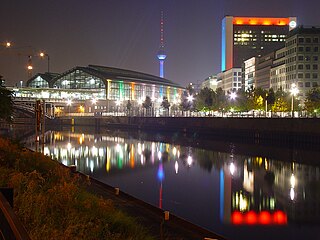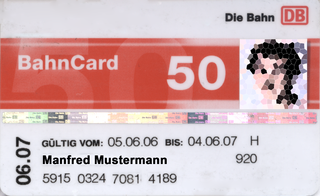
DB Cargo is an international transport and logistics company with a registered office in Mainz and a further administrative office in Frankfurt am Main. It was founded as part of the second stage of the reform of the German railway system (Bahnreform) in the 1990s. DB Cargo is now responsible for all of the rail freight transport activities of the German railway company Deutsche Bahn in Germany and on a global level. Sigrid Evelyn Nikutta took on the role of CEO of DB Cargo in 2020.
Arriva PLC is a British multinational public transport company headquartered in Sunderland, England and owned by Deutsche Bahn. It was established in 1938 as T Cowie Ltd. and through a number of mergers and acquisitions was rebranded Arriva in 1997 and became a subsidiary of Deutsche Bahn in 2010. Arriva operates bus, coach, train, tram and waterbus services in 14 countries across Europe. As of September 2018, it employed 61,845 people and operated 2.4 billion passenger journeys annually. It operates as three divisions: UK Bus, UK Rail and Mainland Europe. Deutsche Bahn announced in 2019 they wished to sell Arriva, but the sale was placed on hold as of November in that year.

The Deutsche Bahn AG is the national railway company of Germany. Headquartered in the Bahntower in Berlin, it is a joint-stock company (AG). The Federal Republic of Germany is its single shareholder.

The Berlin S-Bahn is a rapid transit railway system in and around Berlin, the capital city of Germany. It has been in operation under this name since December 1930, having been previously called the special tariff area Berliner Stadt-, Ring- und Vorortbahnen. It complements the Berlin U-Bahn and is the link to many outer-Berlin areas, such as Berlin Brandenburg Airport. As such, the Berlin S-Bahn blends elements of a commuter rail service and a rapid transit system.

The Deutsche Bundesbahn or DB was formed as the state railway of the newly established Federal Republic of Germany (FRG) on 7 September 1949 as a successor of the Deutsche Reichsbahn-Gesellschaft (DRG). The DB remained the state railway of West Germany until after German reunification, when it was merged with the former East German Deutsche Reichsbahn (DR) to form Deutsche Bahn, which came into existence on 1 January 1994.

DB Fernverkehr AG is a semi-independent division of Deutsche Bahn that operates long-distance passenger trains in Germany. It was founded in 1999 in the second stage of the privatisation of Deutsche Bahn, under the name of DB Reise&Touristik and was renamed in 2003.

DB Regio AG is a subsidiary of Deutsche Bahn which operates regional and commuter train services in Germany. DB Regio AG, headquartered in Frankfurt am Main. It is a 100% subsidiary of the Deutsche Bahn Group and there part of the DB Regio business segment, which also includes DB Regionnetz Verkehrs GmbH and other independent subsidiaries.

Hamburg Hauptbahnhof is the main railway station of the city of Hamburg, Germany. Opened in 1906 to replace four separate terminal stations, today Hamburg Hauptbahnhof is operated by DB Station&Service AG. With an average of 550,000 passengers a day, it is Germany's busiest railway station and the second-busiest in Europe after the Gare du Nord in Paris. It is classed by Deutsche Bahn as a category 1 railway station.
City Night Line, abbreviated CNL, was a train category of German railway company Deutsche Bahn for overnight passenger train services between Germany and neighbouring European countries. In late 2015, Deutsche Bahn announced that it planned to terminate all night train services in December 2016, and this plan was implemented on 11 December 2016. The service on some CNL routes was replaced by ÖBB Nightjet services.

The Dresden S-Bahn is a network of S-Bahn-type commuter train services in Dresden and the surrounding area. It is commissioned by Verkehrsverbund Oberelbe (VVO) from DB Regio Verkehrsbetrieb Südostsachsen and currently consists of three services operating over a 127.7 km-long (79.3 mi) network.

Leipzig Hauptbahnhof is the central railway terminus in Leipzig, Germany. At 83,460 square metres (898,400 sq ft), it is Europe's largest railway station measured by floor area. It has 19 overground platforms housed in six iron train sheds, a multi-level concourse with towering stone arches, and a 298 metres (978 ft) long facade. The two Leipzig City Tunnel platforms were inaugurated in December 2013.

Mannheim Hauptbahnhof is a railway station in Mannheim in the German state of Baden-Württemberg. It is the second largest traffic hub in southwestern Germany after Stuttgart Hauptbahnhof, with 658 trains a day, including 238 long-distance trains. It is also a key station in the Rhine-Neckar S-Bahn. 100,000 passengers embark, disembark or transfer between trains at the station each day. The station was modernised in 2001. It is classified by Deutsche Bahn as a category 2 station.
DB Netz AG is a major subsidiary of Deutsche Bahn that owns and operates a majority of the German railway system. It is one of the largest railway infrastructure manager by length and transport volume of its network.

BahnCard is a discount subscription programme offered by Deutsche Bahn (DB), the German national railway company. Unlike airline loyalty programs, but similarly to the UK Railcard, the BahnCard entitles the passenger to a discount price and must be purchased prior to travel. The BahnCard is offered in a non-business and a business version called BahnCard Business. Non-business BahnCard contracts are automatically renewed each year, unless they are cancelled with sufficient notice. Three variants of BahnCard are sold by Deutsche Bahn: The BahnCard 25, the BahnCard 50, and the Mobility BahnCard 100. The first two variants allow passengers to get 25% and 50% discount respectively on standard long-distance rail fares, while the Mobility BahnCard 100 is a type of annual ticket that allows free unlimited travel on most of the German railway network for a fixed price. The (non-business) BahnCard 25/50 are valid for one year and can only be purchased by subscription. If they are not canceled no later than six weeks before the expiry date, their term is automatically extended by another year. BahnCard Business 25/50 are also valid for one year but require no cancellation. Unlike the personal BahnCard, BahnCard Business can be combined with the discount that is granted to large-volume business customers.

The Frankfurt–Mannheim high-speed railway is a planned German high-speed railway between Frankfurt am Main and Mannheim.
Südostbayernbahn is one of several regional railway networks in Germany owned by Germany's national railway, Deutsche Bahn AG. Since 2001, the network has included the railway hub of Mühldorf which connects 7 major railway lines from Munich, Rosenheim, Freilassing, Burghausen, Simbach am Inn, Passau and Landshut, forming a star-shaped network of lines called Linienstern Mühldorf. SüdostBayernBahn is subordinated to DB RegioNetz Verkehr and DB RegioNetz Infrastruktur.
DB AutoZug GmbH was a German rail transport company that provided automobile (Motorail) and night passenger train services for Deutsche Bahn AG. It was based in Dortmund and was a wholly owned subsidiary of Deutsche Bahn AG. On 30 September 2013 the company was merged into DB AG's long-distance division DB Fernverkehr.

Süd-Thüringen-Bahn GmbH (STB) is a public, non-state-owned railway company founded on 10 December 1999. The shareholders are Erfurter Bahn GmbH (EB) and Hessische Landesbahn GmbH (HLB), each with a 50 percent stake. The company is based at Erfurter Bahn in Erfurt, Thuringia. The operating location and operational management are located in Meiningen, Thuringia.
The S-Bahn Berlin GmbH is the operator of the Berlin S-Bahn. The company was founded on 1 January 1995 as a wholly owned subsidiary of Deutsche Bahn.












